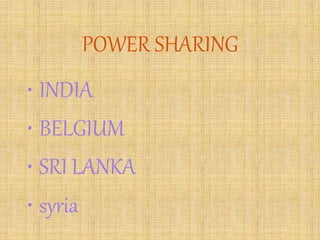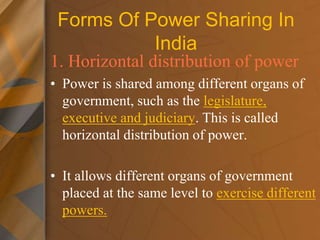Power Sharing in India, Belgium,Sri LAnka & Syra
- 1. POWER SHARING ŌĆó INDIA ŌĆó BELGIUM ŌĆó SRI LANKA ŌĆó syria
- 2. POWER
- 3. MEANING
- 4. ŌĆó
- 7. Power Sharing ŌĆó Power sharing is the very spirit of democracy. ŌĆó A democratic rule involves sharing power with those affected by its exercise, and who have to live with its effects. ŌĆó All communities, social groups get their say in the governance.
- 8. Power Sharing in India ŌĆó People of India elect their representative through direct franchise. ŌĆó After that, peopleŌĆÖs representatives elect the government to make or amend rules & regulations and to carry out day to day functioning of governance.
- 9. Power Sharing in India ŌĆó In a democracy, through institutions of self- governance, people rule themselves. ŌĆó In a good democratic government, everyone has a voice in the shaping of public policies. ŌĆó In a democracy, political power should be distributed among as many citizens as possible.
- 10. Need Of Power Sharing ( Reducing of Conflicts) ŌĆó Power sharing helps in reducing the conflict between various social groups. Hence, power sharing is necessary for maintaining social harmony and peace. ŌĆó Power sharing helps in avoiding the tyranny of majority. The tyranny of majority not only destroys the minority social groups but also the majority social group.
- 11. Need Of Power Sharing ( Reducing of Conflicts) ŌĆó PeopleŌĆÖs voice forms the basis of a democratic government. Hence, power sharing is essential to respect the spirit of democracy. ŌĆó Avoiding conflict in society and preventing majority tyranny are considered as prudential reasons for power sharing. Maintaining the spirit of democracy is considered as the moral reason for power sharing.
- 12. Forms Of Power Sharing In India 1. Horizontal distribution of power ŌĆó Power is shared among different organs of government, such as the legislature, executive and judiciary. This is called horizontal distribution of power. ŌĆó It allows different organs of government placed at the same level to exercise different powers.
- 13. Horizontal distribution of power ŌĆó This ensures that no organ exercises unlimited powers. ŌĆó Each organ is checked by the other, which results in a balance of power among various institutions. This arrangement is also called a system of checks and balances.
- 14. Horizontal distribution of power ŌĆó The executive enjoys official power but is answerable to the legislature. ŌĆó The legislature has the right to make or amend laws but it is answerable to the people. ŌĆó The judiciary is independent and ensures that the law of the land is obeyed by legislature and executive.
- 16. Horizontal Distribution Of Power Indian Government Legislature Executive Judiciary
- 17. Vertical Distribution Of Power Municipality/Panchayat State Government Union/Central Government
- 20. Belgium (French Belgique; Dutch Belgi├½), constitutional monarchy in northwestern Europe. Belgium is one of the smallest and most densely populated European countries. It is also the most urbanized; 97 percent of its people live in urban areas. Together with Netherlands and Luxembourg, Belgium forms the Low, or Benelux, Countries. The countryŌĆÖs name comes from the Belgae, a Celtic people who lived in the region and were conquered by Roman general Julius Caesar in 57 BC. Its capital and largest city is Brussels.
- 21. Belgium is situated between France and the plains of northern Europe, and it borders the North Sea. Because of its geographic position as a crossroads of Europe, Belgium has been a major commercial center since the Middle Ages. The North Sea has been the countryŌĆÖs outlet for trade with the rest of the world. BelgiumŌĆÖs geographic location has also given it strategic importance, and many battles have been fought for control of the area. Belgium became an independent country in 1830.
- 33. The "independence flag" of Syria, used before the Ba'athist coup in 1963, has been widely used by protesters as an opposition flag and has been adopted officially by the Syrian National Coalition and the Free Syrian Army.
- 34. ?
- 38. ŌĆó Bashar Hafez al-Assad (born 11 September 1965) is the President of Syria and Regional Secretary of the Syrian-led branch of the Arab Socialist Ba'ath Party. He has served as President since 2000, when he succeeded his father, Hafez al- Assad, who had ruled Syria for 30 years prior to his death. Bashar Al-Assad
- 39. The armies and forces that support the Syrian government are: ŌĆó Syrian Armed Forces ŌĆó Jaysh al-Sha'bi ŌĆó Shabiha ŌĆó National Defense Force ŌĆó al-Abbas brigade ŌĆó Lijan militias Syrian Government ŌĆó Iran: Revolutionary Guards Foreign militants: ŌĆó Hezbollah ŌĆó PFLPŌĆōGC ŌĆó Houthis ŌĆó Others
- 40. ŌĆó In June 2013, the death toll was updated to 92,900ŌĆō100,000 by the United Nations. According to various opposition activist groups, between 72,960 and 96,430 people have been killed, of which about half were civilians, but also including 58,500 armed combatants consisting of both the Syrian Army and rebel forces, up to 1,000 opposition protesters and 1,000 government officials. Consequences
- 41. How is the situation nowadays?
- 42. Thank You ’üŖ
- 43. Made Group IV Garima Bulani Yash Agrawal Priyanshu Khameria Sanidhya Khatri Archie Peshwani











































